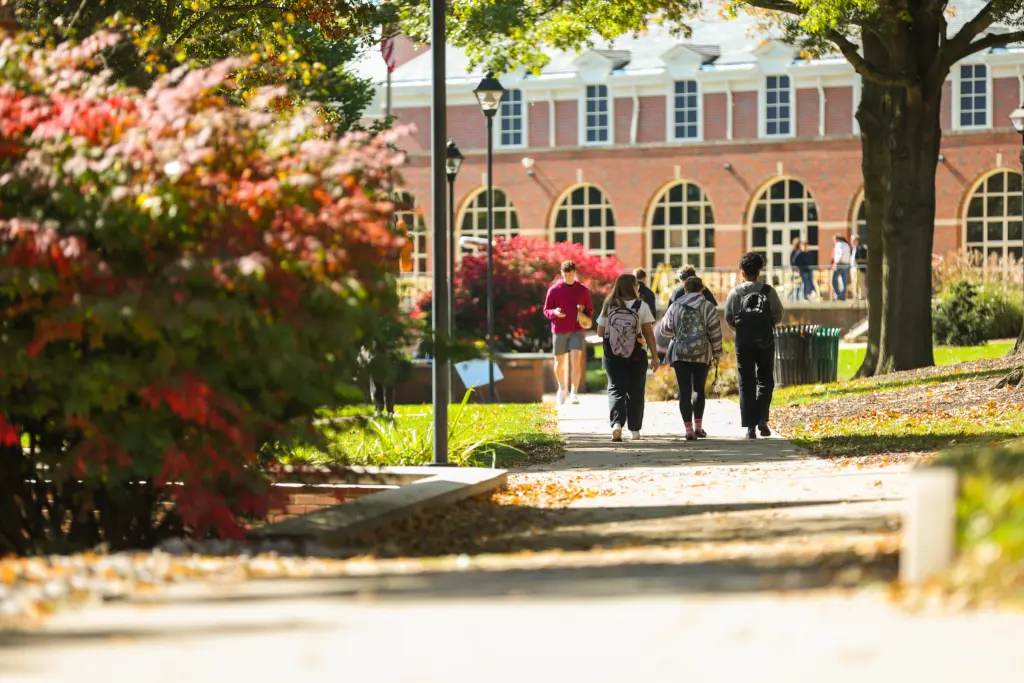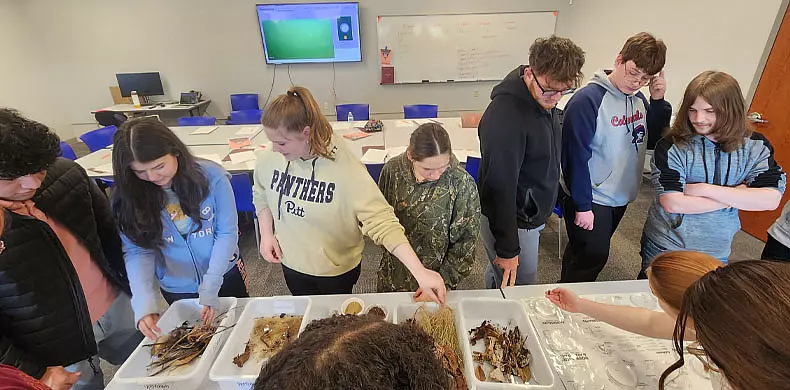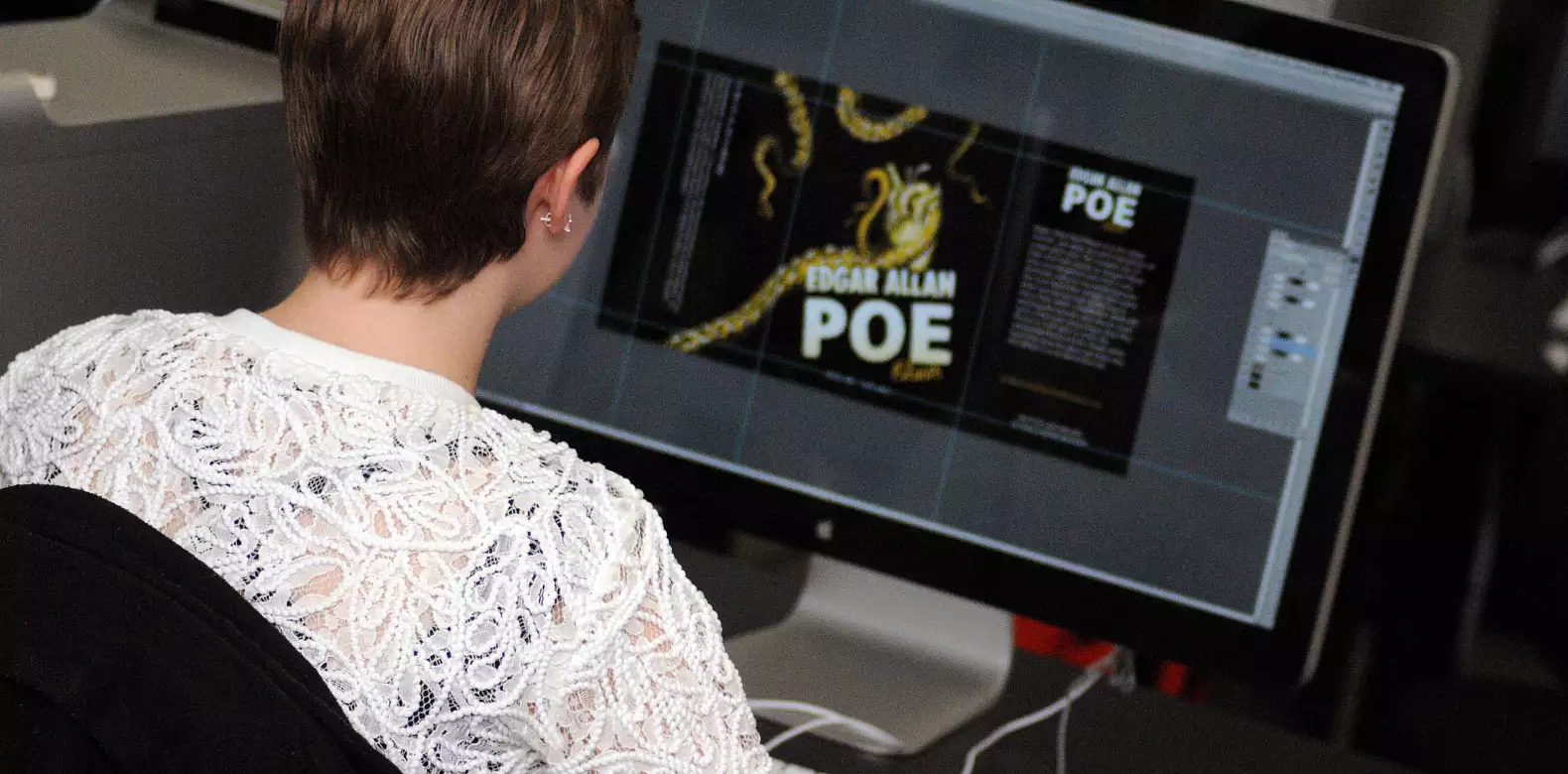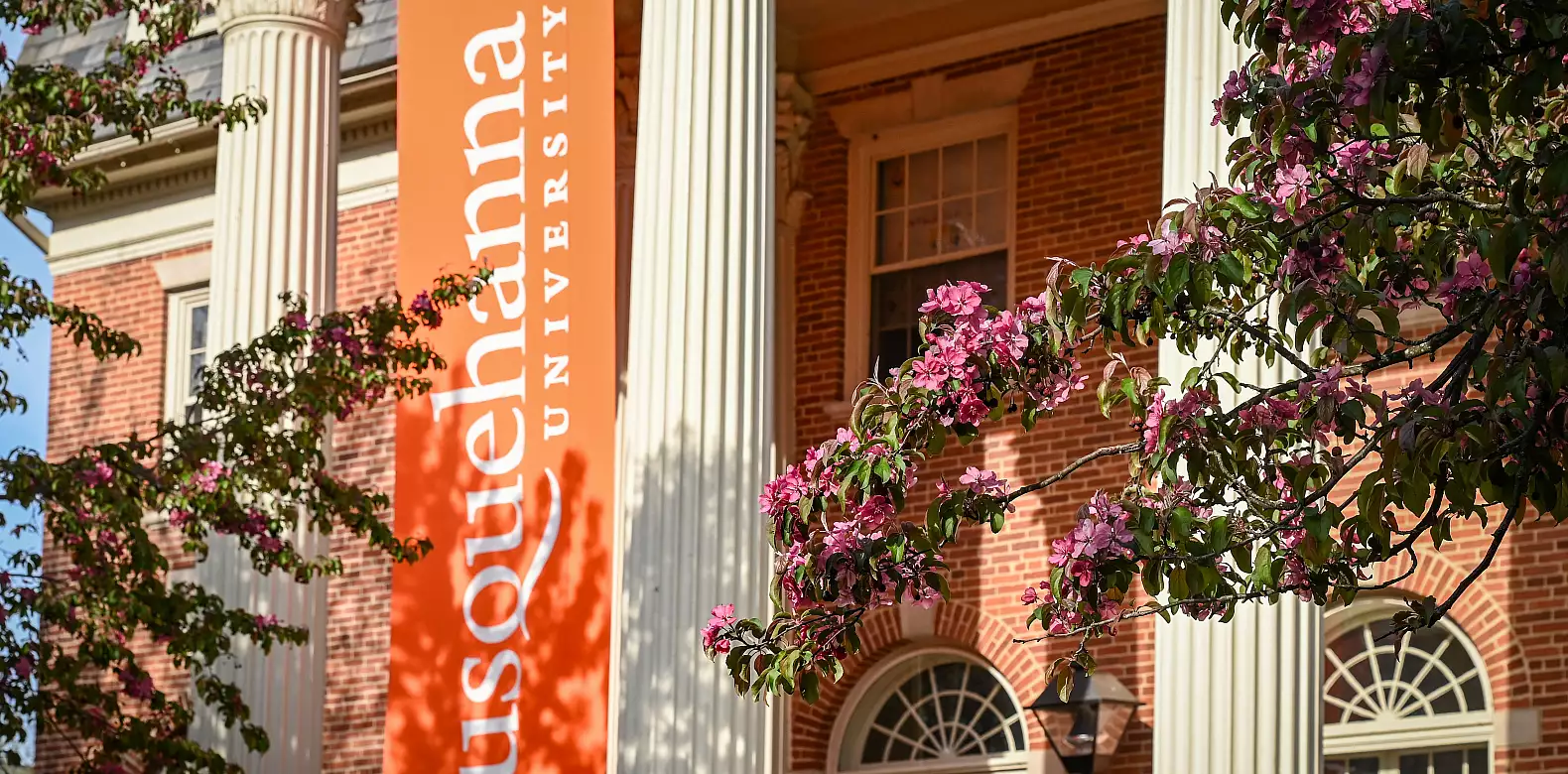
Susquehanna’s Honors Program
Become a future leader in Susquehanna’s Honors Program, where your intellectual curiosity and scholarly pursuits will shape a positive global impact. From your first moment on campus, you’ll be immersed in a group of high-achieving scholars, forging lifelong bonds and benefiting from a dedicated living-learning community.
Designed for the university’s most academically talented students, this four-year honors experience nurtures your pursuit of intellectual and creative excellence. With a series of specifically structured courses and projects crafted to encourage exploration, Susquehanna’s Honors Program fosters the integration of knowledge across disciplines in intellectually stimulating environments.
Honors Program Benefits & Opportunities
Susquehanna’s Honors Program offers exciting opportunities with engaging classes, more opportunities to interact with faculty, special housing options, exclusive events and activities, and conference funding. Students who fulfill program requirements earn the prestigious University Honors designation on their diplomas.
Fueling the mission of the university’s Honors Program to create a vibrant community for intellectually curious students, the Student Honors Council serves as a liaison between students and the honors director, assistant director and the Faculty Honors Board. The council actively recruits new members and organizes enriching discussions, activities and programs — from cultural events to community service.
First-year honors students call Hassinger Hall home. Students can attend events like films, speaking engagements and panels, all with the aim of fostering intellectual curiosity, discussions and opportunities for learning outside the classroom.
Over the course of their time at Susquehanna, honors students can select exclusive, preferential housing, which continues to foster a community of scholars. Honors housing for sophomores and juniors is at Seibert Hall and senior housing is located on 18th Street.
Susquehanna’s Honors Program encourages studying abroad and participating in off-campus experiences as part of your academic journey. Global exploration can fulfill multiple Honors Program requirements, often through Honors Seminar credit.
Each year, Susquehanna Honors Program students attend national and regional conferences, where they often present their individual or program research and ideas.
Elevate your education with Susquehanna University’s honors program
Challenge yourself, gain new perspectives and thrive in a supportive academic community.
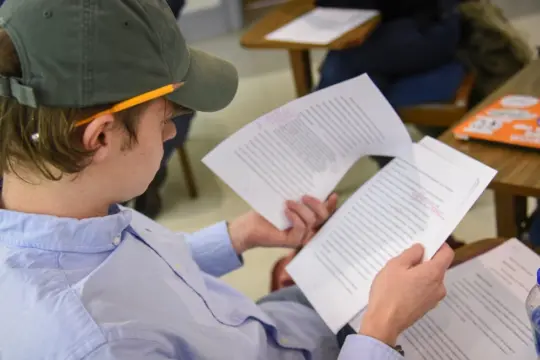
SUSQUEHANNA By the Numbers
More Than Metrics
10%
of enrolling class will be invited to the Honors Program
95%
of students study abroad
Honors College FAQS
At Susquehanna, the Honors Program is offered by invitation. These invitations go out on a rolling basis. After students have been admitted to the university, the Honors Committee reviews applications and extends invitations to qualified candidates via email.
We welcome you to attend the Honors Program information session at one of our on-campus Student Success Day events. If coming to campus is not an option, please join us for our virtual Honors Program event.
Honors courses necessitate heightened critical thinking, typically adopting a seminar format in which active participation in class discussions and the expression of personal thoughts and opinions are the standard. Courses may entail a greater volume of writing compared to standard classes.
Where Passion Meets Purpose
Straight from the Nest

“I have learned the value and importance of a supportive, collaborative academic setting. These contributions will greatly benefit my personal growth and future as a biochemistry Ph.D. candidate.”
— Olivia Basile ’24
Plan Your Classroom
Program Resources
A study of ideas, this course examines intellectual curiosity and critical thinking in both oral and written communication. In this seminar setting, students investigate the process of arriving at a thoughtful position, supported by appropriate evidence. Students learn how to do academic research, evaluate source material, and form hypotheses as well as how to share their questions and ideas with various audiences. Students will practice effective habits for succeeding in a new academic and social environment. 4 SH. CC: Writing and Thinking, First-Year Seminar, Ethics Intensive
An introduction to Western thought, this course emphasizes how humans resist or assimilate, oppose or renew tradition. Philosophical, historical, religious and literary texts of various eras, movements, genres and media are the object of examination and interpretation. 4 SH. CC: Literary Expression, Diversity Intensive
An introduction to Western aesthetics, this course emphasizes how creative processes either align themselves with canonical traditions, or oppose and dismiss them. The course may focus on one form of artistic expression, or, unified by a thematic umbrella, on a combination of various forms of artistic expression. 4 SH. CC: Artistic Expression, Diversity Intensive
Logic was one of the original disciplines in the trivium, the tripartite foundation block of the liberal arts. This course addresses critical thinking within the time-honored frame of deductive argumentation using standard notations, principles and methods used in modern symbolic logic. Logic is examined as the generative epistemology of the scientific method. 4SH. CC: Analytical Thought; Writing Intensive.
An introduction to the social sciences in the context of issues of substantial concern to individuals and society, this course identifies specific social issues and explores them in their historical, psychological, political, and ethical contexts. Students study concepts and methods central to the social sciences, read primary sources in several disciplines, and learn in a highly participatory classroom environment. 4 SH. CC: Social Interactions, Diversity, Ethics.
This history and philosophy of science course focuses on science as a human activity. Through an examination of methods, explanations, limitations and applications of science, students are given sufficient background to be able to recognize distinctive attributes of both actual science and pseudoscience. The course introduces students to the complexity of ethical, political and social issues that are byproducts of science and technology. Experiments in biology, chemistry, geology and physics are used to illustrate the nature and progress of science across time. 4 SH. CC: Scientific Explanations, Interdisciplinary, Writing Intensive, Team Intensive.
This colloquium teaches students how to develop an interdisciplinary learning framework. Over the course of two semesters, students attend interdisciplinary lectures, workshops and field trips. Before each activity, students receive preparatory materials to study ahead of the event to guarantee optimal integration of content. Following each event, students produce critical reflections as assigned by the Colloquium coordinator. At the end of the year, students prepare a portfolio with their critical reflections on attended events and an overview that demonstrates the interdisciplinary reach of their intellectual engagement. The two courses must be taken consecutively, but may be taken in different academic years. 1 SH. CC: Interdisciplinary.
This colloquium teaches students how to develop an interdisciplinary learning framework. Over the course of two semesters, students attend interdisciplinary lectures, workshops and field trips. Before each activity, students receive preparatory materials to study ahead of the event to guarantee optimal integration of content. Following each event, students produce critical reflections as assigned by the Colloquium coordinator. At the end of the year, students prepare a portfolio with their critical reflections on attended events, and an overview demonstrating the interdisciplinary reach of their intellectual engagement. The two courses must be taken consecutively, but may be taken in different academic years. Prerequisite HONS-260. 1 SH CC: Interdisciplinary.
Each Honors student must complete a minimum of eight hours of 300-level upper-division Honors classes. These courses may be designed for a departmental major, but may also be open to Honors students from any major, perform very well in such challenging interdisciplinary environments. Several Honors seminars are offered each semester. If the chosen course is part of the student’s major, the student must submit an “honors-level form,” describing, in consultation with the instructor, how the course assignments for the honors student differs from the other students’ work. 4 SH
The Honors program culminates in an experiential learning project to be completed in a minimum of two and a maximum of four semesters. This research project must address a topic not fully addressed by any specific course at Susquehanna. In case the topic relates to a course, a clear and detailed explanation is expected on how this honors project supersedes and transcends the classwork of other students in the respective course. If students choose a topic in their major, some degree of interdisciplinarity is nevertheless expected of their work. In the semester prior to registration, students must submit a research proposal describing the duration and methodology of the project and the final deliverable product. The proposal must name an advisor from the faculty who has agreed to supervise the project. The project may be interrupted for study abroad, and may be prolonged, should the advisor deem an extension necessary for quality assurance. Once completed, students present their projects publicly in events organized by the Honors program. Minimum of 2 SH. CC: Interdisciplinary. Capstone.
When you enroll at Susquehanna, you’ll be paired with an advisor and application tool to guide you in your course planning and scheduling. The following is an excerpt from the complete course catalog. Enrolled students follow the requirements of the course catalog for the academic year in which they declare each major and/or minor, consult with their advisor(s) and the Academic Planning Tool.
Curriculum
Students typically enroll in one Honors course during each of their eight semesters at Susquehanna. Students must earn a grade of C- or better in all Honors Program courses. All Honors courses satisfy specific combinations of Central Curriculum requirements. Only Honors students may register for Honors courses.
Students participating in the Honors Program must maintain an overall grade point average of 3.40 during each semester at Susquehanna. If a student earns any grade below a C- in any Honors-designated course, the student, at the discretion of the director, may be removed automatically from the Honors Program. The director of the program reviews students’ GPAs at the end of each semester. If an Honors student’s GPA falls below the 3.40 level, the student will receive a warning letter. After a second semester below a 3.40 level GPA, the student is dismissed from the program.
During the first year, students must successfully complete HONS-100 Thought, which focuses on ideas and their expression. All Honor students take HONS-100 as their First-Year Seminar, except SWSB students, who take Global Business Perspectives. To fulfill their first-year Honors requirements, those students must choose two (2) courses from the HONS-low 200 options (200, 210 or 230) or take ENGL-383 Peer Tutoring in Writing and one HONS-low 200. Usually in the spring for the first year, Honors students complete one of the following courses: HONS-200 Thought and Civilization, an interdisciplinary look at literature and cultures; HONS-210 Thought and the Arts, which focuses on Western aesthetics as seen in varied artistic forms; or HONS-230 Analytical Thought-Logic, a course that examines symbolic logic as the generative epistemology of the scientific method.
In their sophomore year, students must successfully complete either HONS-240 Thought and Social Diversity or HONS-250 Thought and the Natural Sciences, which offer cross-disciplinary approaches. Sophomore Honors students also must successfully complete HONS-260 + HONS-261 Sophomore Colloquium, in which they engage with an interdisciplinary view of a chosen theme and write a reflection portfolio.
As juniors, students must successfully complete eight semester hours from a series of HONS-301 seminars that foster interdisciplinary engagement. If the chosen course is part of the student’s major, the student must submit an “honors-level contract” to the Honors Program Director describing, in consultation with the instructor, how the course assignments for the honors student differ from the other students’ work. Since some HONS-301 seminars are occasionally offered as electives that do not fulfill Central Curriculum requirements, students need to check individual course descriptions for Central Curriculum categories and communicate with the Honors Program Director for any needed equivalency adjustment. Honors students who are enrolled in a 3/2 degree are exempt from the two HONS-301 seminar requirements.
The Honors Program culminates in the Honors Research Project, an experiential learning project that applies an interdisciplinary frame to a topic chosen by the student. The research project must last for a minimum of two semesters (two courses, with a minimum of 1 SH each), and may be built around the student’s capstone project. Students may register for HONS-450 after completion of the Sophomore Colloquium (HONS 260 + HONS 261). Once registered for HONS 450, students must submit their project proposal, which requires securing an academic research mentor, and receive official acceptance from the Honors Program Director by the second week of classes of their first HONS 450 semester to continue to be enrolled in the course. The conclusion of the research project must include a public presentation, usually in a forum organized by the Honors Program.
Honors Courses and the Central Curriculum
The Honors Program aligns its courses with Central Curriculum requirements; however, Honors courses fulfill Honors Learning Goals that follow guidelines from the National Collegiate Honors Council. For Honors students, the manner in which Central Curriculum requirements are fulfilled may differ from the manner in which Central Curriculum requirements are defined in the course catalog. Honors students enrolling in Central Curriculum courses should consider whether or not to select Honors options to fulfill those requirements. A student who completes the requirements of the Honors Program also fulfills the interdisciplinary requirement of the Central Curriculum. Students with special concerns about their programs should seek additional advising from the Director and/or Associate Director of the Honors Program.
STUDENTS THRIVE IN HONORS PROGRAM OPEN LEARNING
Susquehanna’s Honors Program provides high-achieving students an academic challenge and a chance to pursue truly interdisciplinary studies.
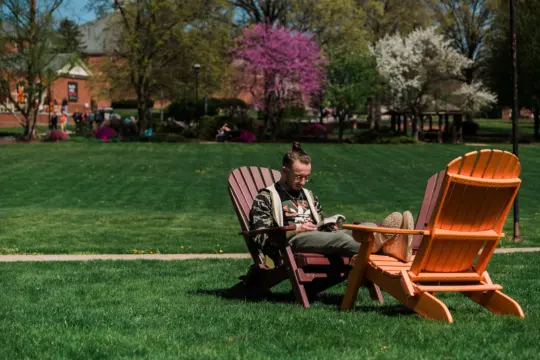
Meet the Faculty
Have Questions?
Contact Us
Start your journey.
